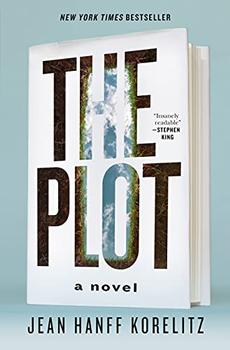Summary | Excerpt | Reviews | Beyond the Book | Readalikes | Genres & Themes | Author Bio

If he was still doing this depressing job a year from now, he probably wouldn't even bother with the laptop.
No, Jake was not looking forward to the about-to-begin session of the Ripley Symposia. He was not looking forward to reconvening with his dreary and annoying colleagues, not one of them a writer he genuinely admired, and certainly he was not looking forward to feigning excitement for another battalion of eager students, each and every one of them likely convinced they would one day write—or perhaps had already written—the Great American Novel.
Most of all, he was not looking forward to pretending that he himself was still a writer, let alone a great one.
It went without saying that Jake had not done any preparation for the imminent term of the Ripley Symposia. He was utterly unfamiliar with any of the sample pages in those annoyingly thick folders. When he'd begun at Ripley he'd persuaded himself that "great teacher" was a laudable addition to "great writer," and he'd given the writing samples of these folks, who'd put down real money to study with him, some very focused attention. But the folders he was now pulling out of his satchel, folders he ought to have begun reading weeks earlier when they'd arrived from Ruth Steuben (the Symposia's highly acerbic office manager) had traveled from Priority Mail box to leather satchel without ever once suffering the indignity of being opened, let alone subjected to intimate examination. Jake looked at them balefully now, as if they themselves were responsible for his procrastination, and the appalling evening that lay ahead of him, as a result.
Because after all, what was there to know about the people whose inner lives these folders contained, who were even now converging on northern Vermont, and the sterile conference rooms of Richard Peng Hall, and this very office, once the one-on-one conferences began in a few days? These particular students, these ardent apprentices, would be utterly indistinguishable from their earlier Ripley counterparts: mid-career professionals convinced they could churn out Clive Cussler adventures, or moms who blogged about their kids and didn't see why that shouldn't entitle them to a regular gig on Good Morning America, or newly retired people "returning to fiction" (secure in the knowledge that fiction had been waiting for them?). Worst of all were the ones who reminded Jake most of himself: "literary novelists," utterly serious, burning with resentment toward anyone who'd gotten there first. The Clive Cusslers and mom bloggers might still be persuadable that Jake was a famous, or at least a "highly regarded" young (now "youngish") novelist, but the would-be David Foster Wallaces and Donna Tartts who were certainly present in the pile of folders? Not so much. This group would be all too aware that Jacob Finch Bonner had fumbled his early shot, failed to produce a good enough second novel or any trace of a third novel, and been sent to the special purgatory for formerly promising writers, from which so few of them ever emerged. (It happened to be untrue that Jake had not produced a third novel, but in this case the untruth was actually preferable to the truth. There had indeed been a third novel, and even a fourth, but those manuscripts, the making of which had together consumed nearly five years of his life, had been rejected by a spectacular array of publishers of declining prestige, from the "legacy" publisher of The Invention of Wonder to the respectable university press that had published his second book, Reverberations, to the many, many small press publication competitions listed in the back of Poets & Writers, which he had spent a small fortune entering, and, needless to say, had failed to win. Given these demoralizing facts, he actually preferred that his students believe he was still struggling to reel in that mythical and stupendous second novel.)
Even without reading the work of his new students, Jake felt he already knew them as intimately as he'd known their earlier counterparts, which was better than he wanted to know them. He knew, for example, that they were far less gifted than they believed they were, or possibly every bit as bad as they secretly feared they were. He knew they wanted things from him that he was utterly unequipped to deliver and had no business pretending he possessed in the first place. He also knew that every one of them was going to fail, and he knew that when he left them behind at the end of the current three-week session they would disappear from his life, never to be thought of again. Which was all he wanted from them, really.
Excerpted from The Plot by Jean Korelitz. Copyright © 2021 by Jean Korelitz. Excerpted by permission of Celadon. All rights reserved. No part of this excerpt may be reproduced or reprinted without permission in writing from the publisher.
Your guide toexceptional books
BookBrowse seeks out and recommends the best in contemporary fiction and nonfiction—books that not only engage and entertain but also deepen our understanding of ourselves and the world around us.